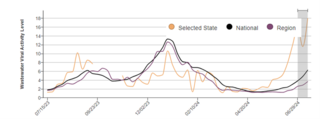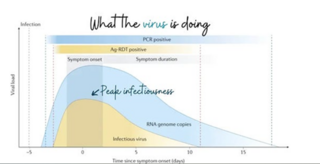Key takeaways:
The current situationWe are now experiencing an expected summer COVID wave. Most of us are aware of cases in friends and family. Fortunately, it does not appear that infections are more severe, and most people recover uneventfully. Several indicators have been increasing:
|
Summer COVID update

Source: CDC
|

Source: Your Local Epidemiologist
Should you do a COVID test?
While testing is not required by the CDC’s guidance, we think it’s a good idea to know if you have COVID, especially if you have a compromised immune system or are over 65. Paxlovid continues to be recommended within five days of symptom onset if you are over the age of 50, and especially over 65 or otherwise at increased risk.
Also, a positive test is a clear indicator that you are likely infectious and should stay home if possible; if you must go out, you should mask, preferably with an N-95 or KN95.
Note that healthcare workers still must isolate for 7 days and until any fever has resolved and symptoms have improved. Rapid antigen testing should be performed on day five and again 48 hours later to confirm a negative test prior to returning to work.
Campus COVID supplies
As our pandemic response continues to evolve toward self-management, campus-based free test distribution sites will be closing this summer.
- We will provide free tests to undergraduates at residential colleges during the start of the fall semester.
- Yale Health will continue to offer subsidized rapid tests at its pharmacy at 55 Lock St.
- Masks will continue to be available through YPPS while supplies last.
Bottom line
- Be aware of situations where you may want to have a mask handy: at airports or crowded indoor venues, or when others are sick in your immediate environment.
- Follow CDC guidance if you get sick, and test if possible.
- Plan on getting a fall vaccine. The updated formulation WILL cover key FLiRT variants and should be available by September. We will update you on our campus vaccine program in future communications.
- If you are over 65 or have a weakened immune system and have not had a vaccine in the past 4 months, you are eligible for a booster now. If you are traveling or going to a gathering you may wish to seek a booster. However, waiting until the new formulation in September is reasonable. You need to wait at least 4 months between doses.
- Note that at Yale Health the 2023-24 formulation is out of stock. Local pharmacies may have supplies available. (Yale Health will cover COVID immunization at pharmacies, as will most other insurances. Check with your insurance provider.)
In health,
Madeline Wilson, MD
Chief Campus Health Officer